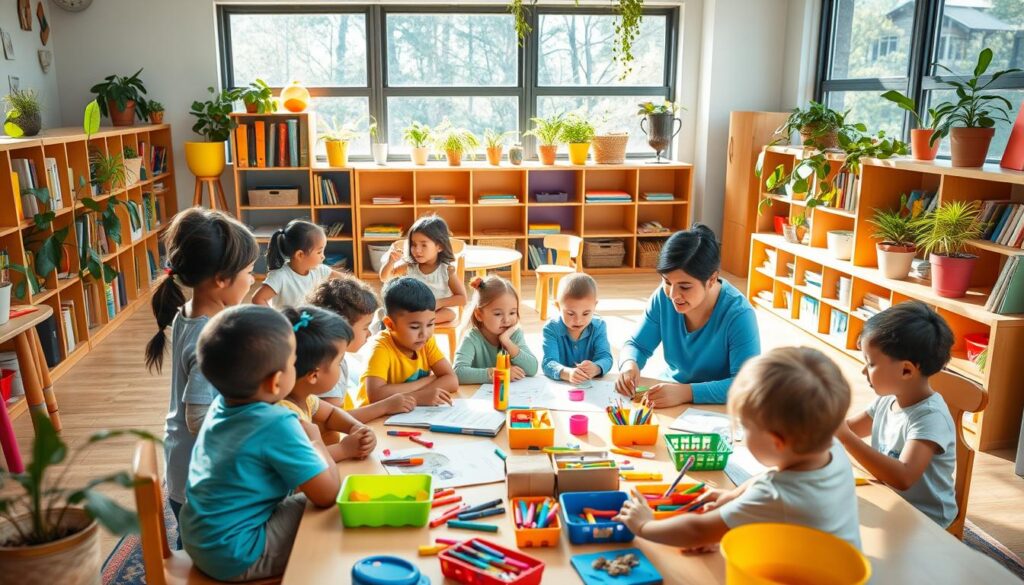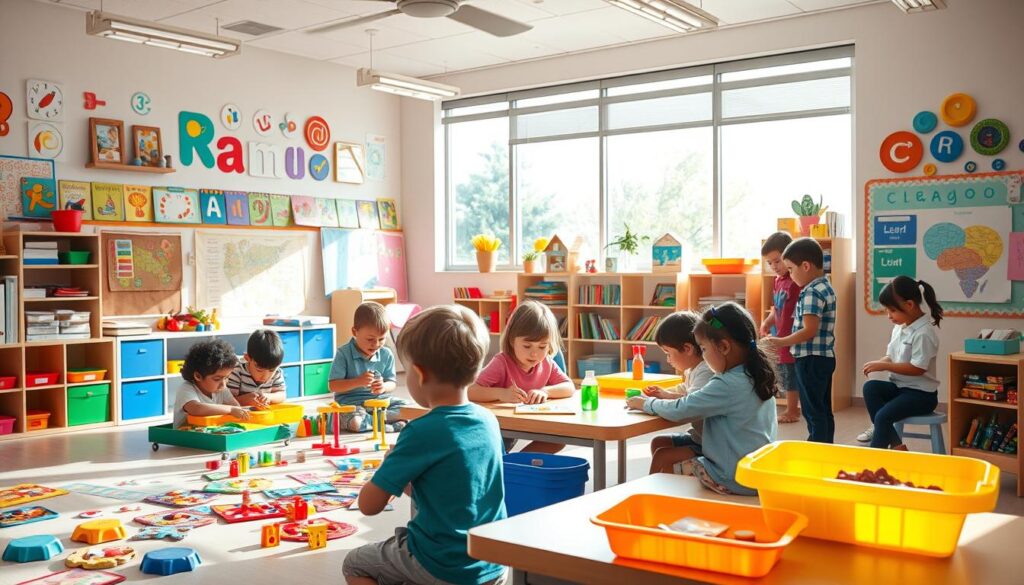Did you know the first five years are key for brain growth? More than 90% of brain development happens then. This shows how important it is for parents to build a strong base for their kids’ future.
We will look at tips for child development that boost early learning. Studies show that nurturing a child’s mind in these years can improve their skills and success in school.
In this article, we’ll share ways to help our kids love learning. We’ll talk about creating a supportive learning space and encouraging curiosity. By following these tips, we can greatly help our child’s growth and set them up for a lifetime of learning.
Key Takeaways
- The first five years are crucial for brain development.
- Effective parenting creates a strong foundation for learning.
- Early experiences greatly influence cognitive skills.
- Using games can enhance learning without formal lessons.
- Child development tips can foster a love for learning.
Welcome to TheRubyWadhwa.com
How To Raise A Brighter Child !
Your Child’s First and Best Teacher: You

We play a key role in our children’s education, starting from a young age. By being involved in their learning, we help their minds grow and feel good. This helps build a strong base for their future, making them curious and eager to learn.
The Role of Parents in Early Learning
As parents, we are our children’s first teachers. This role lets us show them the world in a fun way. By reading, exploring nature, or talking about their day, we spark their interest in many subjects.
Our presence helps them love learning. It also makes them trust us more, so they feel okay asking questions and seeking answers.
Creating a Supportive Learning Environment
It’s important to create a learning space that supports our child’s growth. A place that encourages curiosity and offers chances to explore helps them do their best. We can make this happen by filling their space with books, art, and toys.
When our children feel safe and valued, they’re more likely to take risks and share their thoughts. This helps them grow and reach their full potential.
Why You Can Raise a Brighter Child

Understanding how intelligence works helps us create a better learning environment. We see that things like parental support, emotional care, and fun experiences really help kids grow smarter. By learning about intelligence, we can find ways to make our kids smarter.
Understanding the Science of Intelligence
Intelligence comes from both our genes and our surroundings. Studies show that having a “growth mindset” helps parents support their kids better. For example, reading and playing music with kids improves their focus and memory. It also helps them dream big and think creatively.
Letting kids explore and be creative is key to solving problems well. This is important for their future success.
Believing in Your Child’s Potential
Believing in your child is essential for their growth. Emotional support and seeing failure as a chance to learn helps kids take risks. When parents show excitement for learning, kids are more likely to be interested too.
Teaching kids about themselves and encouraging creativity boosts their brain power. It makes them curious and eager to learn more.
| Strategy | Description | Benefits |
|---|---|---|
| Growth Mindset | Encouraging children to embrace challenges and learn from failures. | Builds resilience and adaptability. |
| Engaging Activities | Involving children in music and reading. | Boosts attention, motivation, and cognitive skills. |
| Creative Exploration | Encouraging children to explore their interests. | Fosters creativity and problem-solving skills. |
| Limit Household Rules | Reducing restrictions to enhance creativity. | Allows for superior adaptability in learning. |
How the Atmosphere in Your Home Can Foster Intelligence

Creating a nurturing home environment is key for kids to learn well. Kids do best when they have stimulating things to explore and create with. An engaging home atmosphere makes learning fun and helps kids grow by sparking their curiosity.
Creating an Engaging and Stimulating Environment
To make a great learning space, we can add many educational items. This includes:
- Books and reading materials that are age-appropriate.
- Educational games that promote critical thinking.
- Art supplies to encourage creative expression.
- Interactive technology like tablets or educational software.
This mix boosts problem-solving and thinking skills. By offering a variety of interests, we meet our child’s learning style. This way, we really help them learn to the fullest.
Positive Reinforcement and Encouragement
Positive feedback is also crucial for kids to grow. Praising their efforts, no matter how small, boosts their confidence. Techniques like verbal appreciation, constructive feedback, and celebrating achievements motivate kids to learn more.
Encouragement makes kids feel valued and supported. This boosts their drive to discover new things and learn.
How to Raise a Brighter Child
As parents, we are key in our children’s learning journey. Using the right strategies can boost their brain power and school success. By getting involved in their learning, we create a space that values curiosity and discovery. Let’s look at ways to support their brain growth at home.
Strategies for Intellectual Growth
There are many ways to improve our child’s thinking skills. Talking deeply with them helps them think critically. When we ask them to share their thoughts, it helps them understand more and learn new words.
- Playing educational games helps solve problems and work together.
- Doing crafts and building things boosts creativity and spatial skills.
- Storytelling sparks imagination and better understanding.
- Reading together improves knowledge and reading skills, helping with brain growth.
By doing these activities, we give our kids the tools they need to succeed in school. We start their lifelong learning journey with our support and encouragement. As they explore their passions, we should celebrate their wins, keeping their motivation and curiosity high.
How To Raise a Brighter Baby: The First Year of Life
The first year of life is key for growing a child’s intelligence. Early stimulation plays a big role. Simple activities boost their thinking and feelings, setting them up for learning later on.
Importance of Early Stimulation
Studies show early learning can help kids grow smarter. By age three, most of a child’s brain is formed. This is when we can make a big impact on their brain and growth.
Simple Activities to Nurture Growth
Interactive play is vital. It helps build strong bonds and boosts intelligence. Here are some great ways to help:
- Reading daily to infants with chunky board books can enhance language and listening skills while fostering a love for reading.
- Singing and reciting rhymes encourages linguistic skills and social interactions.
- Water play offers a fun opportunity for experimentation, aiding cognitive development through sensory experiences.
- Interactive games like hide and seek help develop object permanence, teaching the child about the world around them.
- Imitation games empower the child to influence their environment and promote cognitive development.
Early stimulation is very important. By doing these activities, we help our child grow and learn in a supportive environment.
| Activity | Benefits |
|---|---|
| Daily Reading | Boosts language skills and creates emotional bonds |
| Water Play | Enhances cognitive skills through sensory engagement |
| Interactive Games | Supports understanding of object permanence |
| Imitation of Actions | Encourages independence and cognitive connections |
The Insatiable Drive To Learn: Ages One to Three Years
Children from one to three years old are full of curiosity and love to learn. We can help them grow by playing with them. This way, they learn by doing and exploring.
This method boosts their thinking skills and helps them do well in school.
Meeting Your Child’s Curious Nature
Most parents think it’s key to encourage curiosity in their kids. By age four, half of a child’s adult smarts is already formed. So, it’s vital to keep their curiosity alive.
Helping them think critically is important, say 74% of parents. Letting them ask questions is a great way to do this, with 68% of parents agreeing.
Interactive Play and Learning Opportunities
Play is a big part of learning for kids. It helps them think creatively and solve problems. Between one and two, kids learn about nine new words every day.
Reading to them early also helps them learn more words. This sets them up for success in school later on.
| Statistic | Percentage |
|---|---|
| Parents encouraging inquisitiveness | 33% |
| Parents who believe fostering curiosity is crucial | 62% |
| Parents who agree inquisitiveness helps critical thinking | 74% |
| Children frequently asking thought-provoking questions | 58% |
| Parents emphasizing teaching research skills | 87% |
| Parents citing the importance of patience | 42% |
| Parents encouraging their children to ask questions | 68% |
| Parents believing curiosity leads to a brighter future | 83% |
By creating a supportive and interactive space, we help our kids love learning. This helps them grow smarter and do well in school.
Should You Teach Your Preschooler To Read?
Teaching preschoolers to read can greatly help their growth. As parents, we often wonder if we should start early reading with our kids. Studies show that teaching literacy early can boost their brain development. It sets the stage for a lifelong love of reading and learning.
Benefits of Early Reading Skills
Reading with kids from a young age has many benefits. It improves their language and listening skills. Kids who are read to often have a bigger vocabulary and better thinking skills.
Research shows that early readers hear about 1.4 million more words than non-readers. This exposure sparks creativity and helps with emotional health. It also helps kids focus and be more disciplined, which is good for school.
Effective Approaches to Early Literacy
Using the right methods makes learning to read fun and rewarding. Here are some effective ways to teach early literacy:
- Storytelling: Telling stories sparks kids’ imagination and introduces them to different story types.
- Phonemic awareness: Activities that focus on sounds help kids understand language basics.
- Picture books: Colorful pictures and relatable themes help kids understand and remember stories better.
- Interactive reading: Asking questions about the story helps kids connect with it and think critically.
Just 30 minutes of reading a day can make a big difference. Adding songs or audiobooks makes it even more fun. Encouraging kids to read aloud helps them grow in many ways.
How You Can Encourage Your Child To Be Creative
Supporting our children’s creativity is as vital as their brain development. Creative activities spark imagination, leading to well-rounded growth. By mixing structured learning with free expression, we boost their potential.
Activities that Foster Creativity
Children benefit greatly from diverse activities that enhance their creativity. Here are some key ways:
- Art Projects: Drawing and painting with colors and shapes lets kids express feelings. Research shows drawing calms kids after stressful times.
- Music and Dance: Playing musical instruments strengthens brain connections. Dancing boosts physical and creative expression.
- Outdoor Exploration: Nature sparks curiosity and flexible thinking, perfect for creative play.
- Imaginative Play: Role-play and storytelling improve problem-solving and spark imagination.
- Reading: Engaging books boost imagination and foster a love for stories.
Balancing Structure and Imagination
It’s important to find a balance between learning and creative freedom. Reducing screen time creates a better space for creativity. Letting kids make mistakes teaches them to value exploration over perfection.
Offering open-ended materials like wooden blocks and art supplies encourages creative thinking. Encouraging kids to see challenges from different angles helps them connect ideas. Studies show kids grow more creative when they’re exposed to creative people or activities.
Creativity is a skill we can nurture, not just something kids are born with. By creating a playful, safe space, we foster a culture of exploration. This ensures our children continue to grow creatively as they mature.
Conclusion
Our journey on how to raise a brighter child focuses on early learning and a nurturing home. We also encourage our children’s curiosity and creativity. The insights shared are based on decades of research and practical child development tips.
As parents, we play a crucial role in fostering our children’s intelligence. Studies show that authoritative parenting leads to better academic and emotional outcomes. By using these strategies, we nurture our child’s potential and set them up for success.
The impact of our efforts today will last a lifetime. It will lead to stronger relationships, resilience, and problem-solving skills. As we embark on this journey, we look forward to seeing our children thrive and bringing joy to our family.
FAQ
What are effective ways to foster my child’s potential?
To help your child grow, create a supportive space. Talk to them, play educational games, and pick activities they like. Believing in them can really help their brain grow.
How can I promote my child’s academic success?
To help your child do well in school, start with simple steps at home. Make reading fun, solve problems together, and play games that teach. Always celebrate their wins, big or small, to keep them excited about learning.
What role does early stimulation play in my child’s development?
Early stimulation is key for a baby’s first year. Give them rich experiences like music, colors, and textures. This helps them grow, feel safe, and builds their brain.
How can I encourage my child’s curiosity from ages one to three?
To spark curiosity in toddlers, offer lots of chances to explore and play. Try sandbox play, water fun, and sensory bins. These activities help them learn and discover new things.
Are there benefits to teaching preschoolers to read?
Yes, teaching young kids to read boosts their brain and lays the groundwork for reading later. Start with phonics, stories, and picture books. It can spark a love for reading and help them succeed in school.
How can I stimulate my child’s creativity?
To spark creativity, try activities that let them think freely, like art, music, and role-playing. Mix structured learning with free play. This lets them explore their creativity and grow.